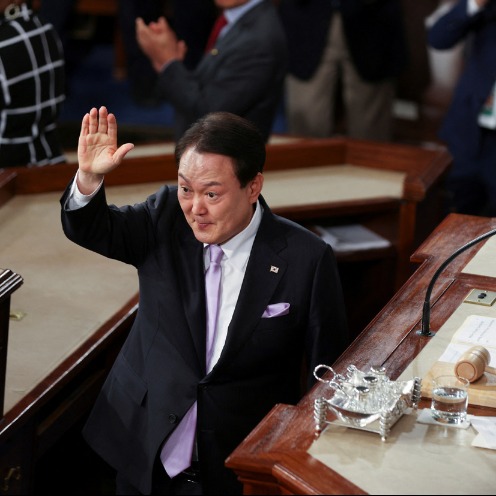



ROK President Yoon Suk-yeol deserves some credit for the address he delivered, in English, to a joint session of US Congress in Washington on Thursday.
The ROK leader apparently did a lot of homework and preparation for it, including learning the song American Pie, which he sang at the state dinner in the White House at the request of his host US President Joe Biden earlier the same day.
However, while his rendition of the song may have earned him warm applause from Biden and his retinue, and his speech received a standing ovation from US lawmakers, once the glow of those receptions fades when he is on his way home, the ROK leader will be face to face with the uneasiness his I-bank-on-you visit to Washington has caused at home and in the region.
Yoon's efforts to ensure his visit would be fruitful started months earlier with his overtures to mend ties with Japan, something Washington had long urged. Soon after declaring that it would be domestic foundations, instead of Japan, that would pay compensation for the forced labor in Japanese companies during World War II, Yoon told the Washington Post in Seoul on Wednesday before starting off for Washington that he "can't accept the notion" that Japan should be forced to kneel "because of what happened 100 years ago".
It has been smart diplomacy that enabled the ROK, a small country encircled by bigger neighbors, to enjoy the favorable conditions that it needed to make the "Miracle on the Han River" happen from the 1960s to the 1980s, that saw it become a developed economy in the 1990s, and earned it international respect and regional support.
A prosecutor-turned president born and growing up in that economic boom, which makes him different from his predecessors who experienced the war, it appears that Yoon has been swayed by only being familiar with the US side of the ROK's success.
He risks surging discontent at home over his de facto declaration of a big change in the ROK's diplomacy that had long valued its strategic autonomy and stressed on striking a geopolitical balance in the region — seeking reconciliation with Pyongyang, defending its baseline on historical issues with Tokyo and keeping constructive relations among Beijing, Washington and Moscow.
His speech therefore only reinforced that he lacks the prudence, vision and courage to continue on the ROK's well-proven diplomatic path, which has been the foundation for the ROK's sustainable prosperity.
To curry favor with the US lawmakers, Yoon not only quoted or mentioned quite a few US presidents, scholars, business people and artists, but also made a presumptive statement tracing "the ties of our cooperation and exchange" to over 140 years ago "since the establishment of diplomatic relations in 1882". The ROK, however, was founded in 1948, and joined the United Nations in 1991.
He dedicated nearly one-fourth of his speech, the opening part, to repeatedly hail US "heroes" for the sacrifices they made for the ROK, saying "sons and daughters of America sacrificed their lives to 'defend a country they never knew and a people they never met'." That also applies to Vietnam, Iraq and Afghanistan to name just a few.
Apparently he wanted to avoid mentioning China in his speech, but he had the audacity to mention that "the US 1st Marine Division miraculously broke through a wave of 120,000 Chinese troops at the Battle of Lake Changjin", which won him the first long standing applause from US lawmakers, and showed his readiness to throw the ROK in the arms of Washington at the expense of irking Beijing. Something he has already done with his recent irresponsible remarks to the Reuters that the Taiwan question is "a global issue" similar to that of the two Koreas.
Particularly, the aggressiveness he has demonstrated against Pyongyang, passing all the buck to the ROK's northern neighbor and ignoring the ugly role Washington is playing to speculate on the peninsula's division for its narrow ends, is worrisome as that turns the ROK from a farsighted peace promoter to a warmonger sacrificing itself for US hegemony.
Likewise, Yoon's blind siding with Washington on the Ukraine crisis will not only harm the international efforts to promote peace talks but also directly make the regional situation more complicated in the Northeast Asia.
Yoon continues to lift the lid on Pandora's box oblivious to what he is releasing.
If you have any problems with this article, please contact us at app@chinadaily.com.cn and we'll immediately get back to you.